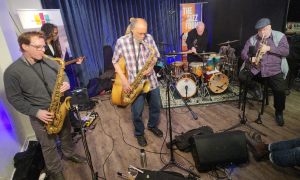Home » Jazz Articles » Live Review » Vilnius Mama Jazz Festival 2023
Vilnius Mama Jazz Festival 2023

Courtesy Edvardas Blaževič
While booking acts which might please a wide range of music lovers, the Festival focused on prominent women in jazz for this year's event.
State Youth Theater
Vilnius, Lithuania
May 25-28, 2023
Introduction
Now the largest city in the Baltic States, the Lithuanian capital Vilnius once again hosted the Mama Jazz Festival for its 23rd edition. While booking acts which might please a wide range of music lovers, the Festival focused on prominent women in jazz for this year's event. Fitting, really, as the founder and driving force behind the whole extravaganza is a woman, Judita Bartoðevièienë, Mama Jazz herself, who has nurtured the event from small beginnings to a high-profile happening in the heart of the capital. The State Youth Theater, in the center of the UNESCO-listed Old Town, presented eight acts over four evenings, as well as a further nine in the Showcase for Lithuanian Jazz spread across two afternoons.Tiger Trio
Given the theme, it was highly appropriate that one of the headline acts was the Tiger Trio, the triumvirate of French bassist Joëlle Léandre, and the American pair of pianist Myra Melford and flutist Nicole Mitchell. Léandre has consistently championed women's place in improvised music. She was an important part of the European Womens Improvising Group and co-founded Les Diaboliques, a pioneering trio with Swiss pianist Irene Schweizer and Scottish vocalist Maggie Nicols back in 1990, at the time one of the only extant all-women ensembles.Coming off the back of a European tour, it was no surprise that the tigresses leapt right in from the off, Mitchell's flute fluttering over Melford's spiky piano and Léandre's vivacious arco. Unlike most improvising co-operatives, they created a succession of short self-contained pieces, twelve in all including the encore, rather than the more usual set-long flow. It meant they were constantly exploring new terrain without the sometimes meandering segues which can afflict some improv. Spontaneous orchestration resulted in unaccompanied pieces for each woman, as well as duets between Mitchell and each of the other two. The entire performance was a perfect amalgam of virtuosity and musicality, with just a dash of humor as well.
Alone Léandre demonstrated her authoritative tone, incantatory phrasing and rich color palette as her hands gliding continuously up and down the fingerboard to bow a frayed drone. Through her facial expressions she lived every note, as she added melodic variations and ultimately her voice, soaring above the spiraling iterations. Mitchell also flexed her vocal cords, sometimes simultaneously with her flute, the consequent multiphonics blurring the distinction between larynx and instrument. At other times she wordlessly sang or spun out spoken word lines, riffing on "Mama Jazz" on one occasion, but always accentuating the human dimension.
While Melford restricted herself to the piano, the range of nuance and tension she drew from it was exemplary. She delved under the bonnet to accompany some of the more abstract exchanges, but offered muscular, angular figures which both buttressed and steered. Her solo was a tour de force, allying a stabbing left hand rumble with percussive embellishment from the right, culminating in vibrant glissandos and forearm clusters. In consort with her partners, she called on repeated motifs to create a mesmerizing, undulating carpet of sound which wholly captured the affection of the rapt audience.
Maria Faust Jazz Catastrophe
Copenhagen-based Estonian saxophonist Maria Faust provided another highlight with her Jazz Catastrophe (fourth mutation) trio. Originally envisaged as a big band, Faust has reduced the group down to its essence. Guitarist Lars bech Pilgaards Slowburn was held over from previous mutations, while drummer Kresten Osgood completed the unit. A stalwart of the Danish scene for over 25 years, any group with Osgood among its members is worth hearing and so it proved.The three seamlessly moved between open interplay and Faust's attractive compositions, variously anthemic, rocky and hymn-like, erasing the boundaries between genres. The saxophonist's playing similarly transcended borders, as she kept her overblown squeals within carefully ordained limits, never veering into a total freak out. It seemed that she employed such unconventional sounds in a thoroughly personal way, always deploying them with purpose.
So a folky head might emerge from floating brew of bubbling saxophone, chiming guitar and sensitive drum commentary, or a raucous unison materialize from guitar/drum headbanging. On guitar and effects, Pilgaard filled out the sound, both trading in textures—a motorbike revving, a swooping synth—and supplying a framework, whether of sunny gentle chording or moody spacious smoldering.
Osgood enjoyed himself garlanding the pulse with masterful extemporizations, and once mischievously prolonging a vamp to delay Faust's entry. They concluded their set in a fine manner with "Happy And Fast Feet," which built through slow, aching repetition to an impassioned climax, with Faust jumping up and down as she screamed in the falsetto register, before a sudden final decompression.
Vladimir Tarasov's Austrian Circle
As befits his status as one of the forefathers of Lithuanian jazz, veteran drummer Vladimir Tarasov has been a mainstay of the Mama Jazz Festival since the start. His fame stems from his participation in the illustrious Ganelin/Chekasin/Tarasov trio which took the world by storm in the late 1970s. He has recorded with a host of star names including Anthony Braxton, Bill Laswell and Tomasz Stańko, and remains active on the international stage with the acclaimed improvising trio Jones Jones with American bassist Mark Dresser and saxophonist Larry Ochs.For this appearance he convened a group under the moniker Austrian Circle which united him with old friends Andreas Schreiber on violin, Peter Herbert on bass and Christoph Cech on piano. Tarasov's initial kinetic clatter in tandem with Herbert's bowed flurries established the parameters: unfettered interaction. Soon the temperature cooled to allow some rhapsodic piano, which gradually became more tempestuous, commencing a cycle of waxing and waning intensity, from surging tumult to chamber ambience, which persisted throughout the set.
It was often Tarasov who steered from behind his extended drum kit, whether by initiating delicate timbral interchange by placing untethered cymbals on the head of his kettle drum, or by abandoning the explicit rhythm of a jazzy passage for more uncharted territory. Schreiber's response variously encompassed hazy melody, oblique formality and the sort of demented hoedown which recalled Billy Bang in his heyday. In an upending of convention, they finished not with a blowout, but an increasingly quiet give and take.
Euroradio Jazz Orchestra
The Euroradio Jazz Orchestra (EJO), conducted by young Lithuanian composer and trombonist Jievaras Jasinskis garnered one of the strongest reactions of the four days from the crowd who demanded two encores. Every year, the Jazz Producers of the European Broadcasting Union put together a big band under the banner of the EJO, which is broadcast live across the network. Thus it was that 18 musicians from 15 countries were ranged across the stage to play Jasinskis' multi-part opus "P(i)e(a)ce Of Vilnius," specially written to celebrate the city's 700th birthday.Full of criss-crossing lines and punchy orchestral timbres, separated by mercurial refrains and more impressionistic segments, the work allowed brief solos from the whole orchestra. Although such elevator pitch opportunities made it difficult to work up a head of steam, too many impressed to list. However even among these some were notable: a barnstorming tenor saxophone outing by the UK's Emma Rawicz, a powerful raw baritone exhortation from the home team's Karolis Šarkus, and a blistering trumpet explosion from Latvia's Reinis Purinš. Jasinskis himself blew a mean trombone on the first encore over an earthy groove, while the second, a rousing march, contained quickfire solos from each section in rotation. Although having only been together for a week, and with just one previous concert under their belts, the EJO generated a wonderfully tight and exciting experience.
Elsewhere on the Main Stage
Renowned American-born Danish percussionist Marilyn Mazur appeared alone on stage to open the Festival, reinforcing the theme of Women In Jazz. Mazur, who has performed with Miles Davis, Wayne Shorter and Jan Garbarek over the years, was surrounded by an array of drums, gongs, cymbals and other devices assembled by the Festival organizers, which she fell upon with the appetite of a kid in a sweetshop. The spectacle lent the whole set an element of visual theater. Such was her enthusiasm that she had an athletic workout darting between the instruments, contrasting meter and texture. Sometimes she combined them with apparently on-the-fly lyrics, once while beating a spare cadence on a clay pot. She also sang at the piano, accompanying a lilting rhapsody, then ended her set at the conga with an easy rhythm and Latin-inflected vocal.Scottish drummer Graham Costello's Strata quintet proved well-named. Over maximalist drums, the leader's writing layered a series of minimalist patterns which pianist Fergus McCreadie, guitarist Kevin Cahill, bass guitarist Gus Stirrat and bass clarinetist Harry Weir, marshaled with intense focus. Although there were no solos as such, Costello's chattering pulsation frequently caught the ear. The outfit's abrupt gear changes and subtle modulations shifted the dynamic from hypnotic to agitated and back again over the course of a set which put the drummer's ethos center stage.
French trumpeter Airelle Besson closed the Festival with a well-received presentation by her Try! quartet, featuring Benjamin Moussay on keyboards, Fabrice Moreau on drums and Lynn Cassier on voice. Their set alternated pretty, haunting strains, knotty unisons and more fractious but still consonant episodes. But the sweetness was underlain by real talent, demonstrated by Moreau in one solo which he cleverly constructed from a thematic motif, and by Besson and Moussay in their playful first encore, handled as a dizzying two-hander, in which they continually toggled roles between lead and support.
Showcase Stage
An enduring attraction of the Mama Jazz Festival is its promotion of Lithuanian musicians through a Showcase Stage held during the event proper. Nine groups took to the spotlight seeking to impress listeners who included promoters and journalists from around Europe as well as the general public. However one of the most appealing acts was actually Ukrainian, invited out of solidarity with their oppressed neighbor. Named after a traditional wooden storage and drinking vessel, Kinva put folk melodies at the heart of their music. Songs which have been repositories for centuries of human feelings—pain, tragedy, love, hope—acted as the basis for richly voiced interpretations.Now residing in Warsaw, the threesome of pianist Anastasija Litvinyuk, drummer Igor Hnydyn and bassist Roman Chraniuk appeared wearing traditionally embroidered shirts giving visual form to a compelling concept. While the catchy tunes called forth memories of EST, one of the seminal influences on many European piano trios, they followed a distinctive path. They evoked both jazz and classical traits, as well as acknowledging the origins of their material by occasionally voicing the words. Their set closer was a locomotive flag waver, Litvinyuk's formidable left hand vying with Hnydyn's clattery drums, in a vibrantly shaded performance which was both potent and joyous.
Similarly based upon tradition, drummer Arkady Gotesman's Project Prayer united infectious airs with outside attitude. In this case it was drawing upon liturgical refrains and Jewish folklore, with Gotesman joined by a group of crack Lithuanian improvisers. Particularly noteworthy were a scratchy dialogue between Gotesman and guitarist Dominiykas Norkūnas, atop the harrumphing tuba of Simonas Kaupinis, and a fiercely squawking soprano saxophone outpouring courtesy of Kazimieras Jušinskas. Such moments were tempered by glorious intertwining horns in klezmer-derived polyphony and whirlwind dances spun out by the serpentine clarinet of Haroldas Parulis.
All of the bands boasted polished musicianship. The Danish/Lithuanian sextet Snus conflated improv, jazz, noise and rock in neat charts distinguished by unexpected switches. Guitarist Klaudia Indrinliūnaitė's scribbling fretboard heroics furnished the wild card here. Similarly accomplished, the Broken Glass Quartet was nowhere near as fragmented as the name might suggest, but combined unusual instrumentation, thoughtful intricate arrangements, syncopated heads and jazzy soloing, especially by leader and composer Pranas Kentra on guitar. Weird Ugly Fish, the twosome comprising drummer Aiste Kalvelytė and the electronics of Julius Čepukėnas, provided a complete change of pace. Kalvelytė responded to the glitchy circuitry and synth loops with heavy tribal beats, funk tattoos and asymmetric asides in a display of powerhouse drumming.
Vocalist Veronika Chichi led a quintet of some of Lithuania's most talented musicians including pianist Dmitiri Golanov and Gotesman once again. A charismatic and lively presence, Chichi put her strong voice to good use, even wailing through a megaphone to supplement her singing. There was some pleasing interplay among the band too, not least Golanov hammering a dampened note picking up the cadence of Chichi's scat reiterations. Another commanding and energetic singer Kotryna Juodzevičiūtė fronted the KJ Collective, a slightly schizophrenic outfit which swerved between R&B and soul shouting and more jazz-aligned backing.
Outro
While the cast on the main stage largely amplified the Festival aim of celebrating Women In Jazz, the groups in the Showcase suggested that there is still a long way to go before there is parity between the genders, even in the younger echelons of Lithuanian jazz. But recognizing the issue is the first step in addressing it, and there were many hopeful signs as women stepped away from the conventional functions as vocalists.Every night in the acoustically superior State Youth Theater was virtually sold out, with the audiences enthusiastic not only for the more accessible fare, but also for the more challenging acts. Such patronage is likely to ensure many more installments of the Mama Jazz Festival to come, and also to make the occasion popular with artists from a wide range of backgrounds.
Each year the Festival schedules conference style panels. The discussion on what the war in Ukraine meant for jazz included some of the most poignant moments of the whole event when Serhii Hrabar, Director of Jazz Festival Unity in Kyiv, described how concerts were still proceeding amongst the madness in the Ukrainian capital when air raids permitted, proving jazz survives in even the most desperate situations.
Tags
Live Review
Joelle Leandre
John Sharpe
Lithuania
Vilnius
Myra Melford
Nicole Mitchell
Irene Schweizer
Maggie Nicols
Maria Faust
Lars Pilgaard
Kresten Osgood
Vladimir Tarasov
anthony braxton
Bill Laswell
tomasz stanko
Mark Dresser
Larry Ochs
Andreas Schreiber
Peter Herbert
Christoph Cech
Jievaras Jasinskis
Emma Rawicz
Maria Mazur
Graham Costello
Fergus McCreadie
Kevin Cahill
Gus Stirrat
Harry Weir
Airelle Besson
Benjamin Moussay
Fabrice Moreau
Lynn Cassier
Arkady Gotesman
PREVIOUS / NEXT
Support All About Jazz
 All About Jazz has been a pillar of jazz since 1995, championing it as an art form and, more importantly, supporting the musicians who make it. Our enduring commitment has made "AAJ" one of the most culturally important websites of its kind, read by hundreds of thousands of fans, musicians and industry figures every month.
All About Jazz has been a pillar of jazz since 1995, championing it as an art form and, more importantly, supporting the musicians who make it. Our enduring commitment has made "AAJ" one of the most culturally important websites of its kind, read by hundreds of thousands of fans, musicians and industry figures every month.




























